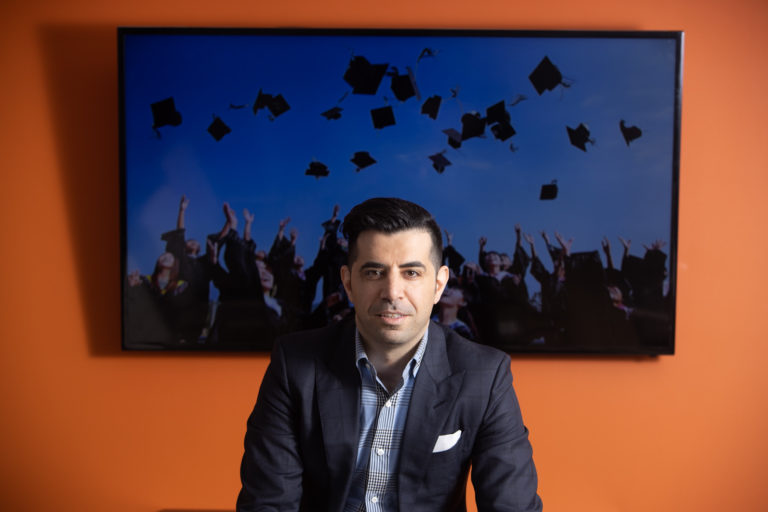
Drawn to Canada for its welcoming reputation and innovation in AI, Dr. Manny Nikjoo immigrated in 2006, where he pursued his Master’s degree at Western University, his MBA at York University’s Schulich School of Business, and his Ph.D. at the University of Toronto.
However, upon arrival, Manny faced the frustrating reality of not having a credit history in Canada. After experiencing the hurdles first hand, building a credit history in the country, Manny teamed up with two fellow first-generation immigrants to design a solution for those following in his footsteps.
Founded in 2018, QuadFi is a fintech company dedicated to providing newcomers with access to fair and convenient financial products. Using alternative data and international credit histories, the company is shifting the primary source of assessment for credit risk from historical data to a newcomer’s prospects in Canada. Manny and his team at QuadFi are on a mission to increase financial inclusion by helping those ignored by traditional lenders.
In this Q+A, we look at Manny’s future with QuadFi and how he and his team are disrupting the personal finance industry.
QuadFi is a fairly new player innovating in an industry typically dominated by traditional banks. Tell us about the company and your vision.
MN: QuadFi is a global fintech company building the future of banking. Our aim is to provide newcomers with access to credit by shifting focus from an individual’s historical data to their future prospects and capabilities. In order to do that, we use machine learning and AI models to accurately assess the future potential of newcomers.
You and your fellow co-founders are all newcomers to Canada. How did your personal experience as a newcomer motivate you to use fintech to increase financial inclusion?
MN: As a first-generation Canadian, I immigrated in 2006 to pursue my Masters at Western University in London, ON. During my first week there, I went to multiple bank branches to get a credit card, and each told me I wasn’t eligible due to having no credit history in Canada, as I came from a country that relied heavily on cash and debit. It was a miserable and frustrating life experience – I couldn’t rent an apartment or a car, and any shopping I did had to be in cash. I soon realized I wasn’t the only one disenfranchised; I encountered military veterans, widows, and young people coming out of school who all had a similar experience. Many people lose out on opportunities and their potential when they don’t have access to credit and capital. After my studies, I joined forces with two fellow first-generation Canadians and with our background in finance, AI and ML, we built a credit solution – QuadFi.
From a technology perspective, how is QuadFi innovating the personal finance landscape?
MN: QuadFi is challenging the traditional underwriting system that relies on historical numbers. Borrowing ideas from other industries, we changed the methodology of traditional financial institutions to build a forward-thinking credit solution that is more accurate, more inclusive, and unbiased. We’re able to do this because of the accuracy of our technology.
Our technology is also innovating the customer experience – we’re offering affordability with no hidden fees, availability as the full automated process to apply for a loan takes less than 5 minutes, and agility as we offer consumers a financial product based on alternative data.
QuadFi is one of 4,000 companies across 70 countries and 150 industries that is a Certified B Corporation®. How is the company actively working to benefit society?
MN: For us, it’s a combination of an internal and external focus. Internally, we are committed to supporting broader change through our hiring, team culture, transparency, investment in ESG, and more. Externally, we are creating the tools to effectively integrate alternative data into the credit market to serve the needs of newcomers and young people, which benefits our society in a meaningful and measurable way.
Why choose Canada as your launching point?
MN: Canada is at the intersection of immigration and AI. In terms of immigration, Canada is a flagship country for newcomers, and yet the traditional system has been unable to create financial tools to serve this customer segment. Canada also shines in its advancement in technology and AI with innovation hubs like the University of Toronto and McGill University, which give us access to bright talent in our field.
With StatsCanada projecting that immigrants will represent between 24.5% and 30.0% of Canada’s population in 2036, how is QuadFi positioned to support this population’s growth?
MN: We started our offerings with the most challenging item in the financial basket of newcomers: credit. A lot of companies shy away from tackling this problem as they’re concerned that newcomers are flight risks, but, as newcomers ourselves, my co-founders and I want to serve and help them with what they need most.
What is the longer-term vision for QuadFi (next 3-5 years)?
MN: Our vision is to go beyond Canadian borders; we want to build the first-ever global institution. We’re looking to expand to the U.S. next year, then develop further to other countries – Europe, South America, etc. We have the technology today to go global, but in terms of infrastructure, we need three to five years.



Leave a Reply